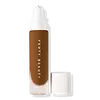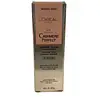Fenty Beauty Pro Filt’r Soft Matte Longwear Liquid Foundation Versus L'Oreal Matte Cashmere Liquid Powder Foundation
What's inside
What's inside
 Key Ingredients
Key Ingredients

 Benefits
Benefits

No benefits
 Concerns
Concerns

 Ingredients Side-by-side
Ingredients Side-by-side

Water
Skin ConditioningDimethicone
EmollientTalc
AbrasivePEG-10 Dimethicone
Skin ConditioningTrimethylsiloxysilicate
EmollientPolypropylene
Isododecane
EmollientCetyl PEG/PPG-10/1 Dimethicone
EmulsifyingNylon-12
Hdi/Trimethylol Hexyllactone Crosspolymer
Phenoxyethanol
PreservativeSodium Chloride
MaskingHydrogen Dimethicone
Glycerin
HumectantMagnesium Sulfate
Sodium Dehydroacetate
PreservativeDisteardimonium Hectorite
StabilisingAluminum Hydroxide
EmollientMethicone
EmollientBenzoic Acid
MaskingDehydroacetic Acid
PreservativePropylene Carbonate
SolventEthylhexylglycerin
Skin ConditioningParfum
MaskingSilica
AbrasiveBiosaccharide Gum-4
Skin ConditioningAnanas Sativus Fruit Extract
Skin ConditioningCarica Papaya Fruit Extract
Skin ConditioningPaullinia Cupana Seed Extract
Skin ConditioningPotassium Sorbate
PreservativeSorbic Acid
PreservativeCI 77891
Cosmetic ColorantIron Oxides
Water, Dimethicone, Talc, PEG-10 Dimethicone, Trimethylsiloxysilicate, Polypropylene, Isododecane, Cetyl PEG/PPG-10/1 Dimethicone, Nylon-12, Hdi/Trimethylol Hexyllactone Crosspolymer, Phenoxyethanol, Sodium Chloride, Hydrogen Dimethicone, Glycerin, Magnesium Sulfate, Sodium Dehydroacetate, Disteardimonium Hectorite, Aluminum Hydroxide, Methicone, Benzoic Acid, Dehydroacetic Acid, Propylene Carbonate, Ethylhexylglycerin, Parfum, Silica, Biosaccharide Gum-4, Ananas Sativus Fruit Extract, Carica Papaya Fruit Extract, Paullinia Cupana Seed Extract, Potassium Sorbate, Sorbic Acid, CI 77891, Iron Oxides
Petroleum Distillates
SolventIsohexadecane
EmollientIsododecane
EmollientPolymethyl Methacrylate
Hdi/Trimethylol Hexyllactone Crosspolymer
Talc
AbrasiveNylon-12
Hydrogenated Styrene/Isoprene Copolymer
Silica
AbrasiveDisteardimonium Hectorite
StabilisingSorbitan Stearate
EmulsifyingPolymethylsilsesquioxane
Propylene Carbonate
SolventPhenoxyethanol
PreservativeParfum
MaskingMethylsilanol PCA
HumectantAlpha-Isomethyl Ionone
PerfumingButylphenyl Methylpropional
PerfumingHydroxyisohexyl 3-Cyclohexene Carboxaldehyde
MaskingHydroxycitronellal
PerfumingCI 77492
Cosmetic ColorantCI 77499
Cosmetic ColorantCI 77491
Cosmetic ColorantPetroleum Distillates, Isohexadecane, Isododecane, Polymethyl Methacrylate, Hdi/Trimethylol Hexyllactone Crosspolymer, Talc, Nylon-12, Hydrogenated Styrene/Isoprene Copolymer, Silica, Disteardimonium Hectorite, Sorbitan Stearate, Polymethylsilsesquioxane, Propylene Carbonate, Phenoxyethanol, Parfum, Methylsilanol PCA, Alpha-Isomethyl Ionone, Butylphenyl Methylpropional, Hydroxyisohexyl 3-Cyclohexene Carboxaldehyde, Hydroxycitronellal, CI 77492, CI 77499, CI 77491
 Reviews
Reviews

Ingredients Explained
These ingredients are found in both products.
Ingredients higher up in an ingredient list are typically present in a larger amount.
Disteardimonium Hectorite comes from the clay mineral named hectorite. It is used to add thickness to a product.
It can also help stabilize a product by helping to disperse other ingredients.
Hectorite is a rare, white clay mineral.
Learn more about Disteardimonium HectoriteThis ingredient is a powder used to improve texture, slip, and give products a silky texture.
Isododecane is a fragrance, emollient, and solvent.
As an emollient, it helps your skin stay soft and hydrated. Emollients help trap moisture into your skin.
Isododecane's role as a solvent makes it a great texture enhancer. It spreads smoothly on skin and does not leave a sticky feeling behind. Isododecane also helps prevent color transfer in makeup products.
Isododecane is not absorbed into skin.
Learn more about IsododecaneNylon-12 is a polymer. It is derived from 12-aminododecanoic acid, an omega-amino fatty acid
According to a manufacturer, it is a talc substitute. Like talc, nylon-12 gives products a satin feel. The manufacturer also claims this ingredients does not block pores and has moderate oil absorption.
This ingredient may not be reef-safe.
Learn more about Nylon-12Parfum is a catch-all term for an ingredient or more that is used to give a scent to products.
Also called "fragrance", this ingredient can be a blend of hundreds of chemicals or plant oils. This means every product with "fragrance" or "parfum" in the ingredients list is a different mixture.
For instance, Habanolide is a proprietary trade name for a specific aroma chemical. When used as a fragrance ingredient in cosmetics, most aroma chemicals fall under the broad labeling category of “FRAGRANCE” or “PARFUM” according to EU and US regulations.
The term 'parfum' or 'fragrance' is not regulated in many countries. In many cases, it is up to the brand to define this term.
For instance, many brands choose to label themselves as "fragrance-free" because they are not using synthetic fragrances. However, their products may still contain ingredients such as essential oils that are considered a fragrance by INCI standards.
One example is Calendula flower extract. Calendula is an essential oil that still imparts a scent or 'fragrance'.
Depending on the blend, the ingredients in the mixture can cause allergies and sensitivities on the skin. Some ingredients that are known EU allergens include linalool and citronellol.
Parfum can also be used to mask or cover an unpleasant scent.
The bottom line is: not all fragrances/parfum/ingredients are created equally. If you are worried about fragrances, we recommend taking a closer look at an ingredient. And of course, we always recommend speaking with a professional.
Learn more about ParfumPhenoxyethanol is a preservative that has germicide, antimicrobial, and aromatic properties. Studies show that phenoxyethanol can prevent microbial growth. By itself, it has a scent that is similar to that of a rose.
It's often used in formulations along with Caprylyl Glycol to preserve the shelf life of products.
This ingredient is a solvent. It helps dissolve active ingredients and alter the texture of products.
Propylene Carbonate is commonly used in makeup and with clay, such as montmorillonite or bentonite.
Studies show this ingredient to be safe for cosmetics. When it is undiluted, it can cause skin irritation. (It is always diluted in skincare and makeup). This ingredient is water-soluble.
Propylene Carbonate is created from propylene glycol and carbonic acid.
Learn more about Propylene CarbonateSilica, also known as silicon dioxide, is a naturally occurring mineral. It is used as a fine, spherical, and porous powder in cosmetics.
Though it has exfoliant properties, the function of silica varies depending on the product.
The unique structure of silica enhances the spreadability and adds smoothness, making it a great texture enhancer.
It is also used as an active carrier, emulsifier, and mattifier due to its ability to absorb excess oil.
In some products, tiny microneedles called spicules are made from silica or hydrolyzed sponge. When you rub them in, they lightly polish away dead skin layers and enhance the penetration of active ingredients.
Learn more about SilicaTalc is a clay mineral. It helps absorb moisture and improve the texture of products. Like other types of clay, Talc can have a slight exfoliating effect on skin. Talc can be added to increase the volume of products.
Some Baby powders are made by combining talc with corn starch. The word "talc" comes from Latin and originates from Arabic. Talc is a mineral commonly found throughout the world.
If you have any concerns about using talc, we recommend checking out the FDA's official page.
Learn more about Talc